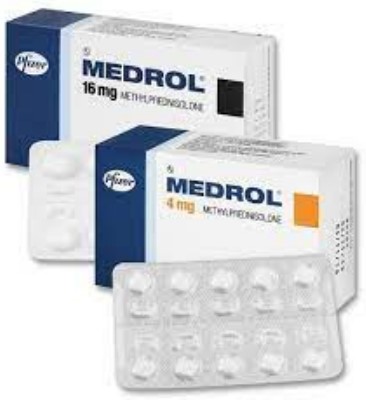Medrol Medication: Uses, Dosage, and Potential Side Effects
 Medrol (methylprednisolone) is a corticosteroid medication used to treat a variety of conditions, including allergies, asthma, arthritis, and skin conditions. It works by reducing inflammation and suppressing the immune system. Medrol is available in both oral and injectable forms. Common side effects of Medrol include nausea, vomiting, headache, and increased appetite. More serious side effects may include increased risk of infection, high blood pressure, and changes in vision. It is important to take Medrol exactly as prescribed by your doctor.
Medrol (methylprednisolone) is a corticosteroid medication used to treat a variety of conditions, including allergies, asthma, arthritis, and skin conditions. It works by reducing inflammation and suppressing the immune system. Medrol is available in both oral and injectable forms. Common side effects of Medrol include nausea, vomiting, headache, and increased appetite. More serious side effects may include increased risk of infection, high blood pressure, and changes in vision. It is important to take Medrol exactly as prescribed by your doctor.
Understanding Medrol Medication: What You Need to Know About Uses, Dosage, and Potential Side Effects
Medrol (methylprednisolone) is a corticosteroid medication used to treat a variety of conditions, including allergies, asthma, and certain types of arthritis. It is also used to reduce inflammation and swelling. While Medrol is generally safe and effective when taken as prescribed, it can cause serious side effects. It is important to understand how to take Medrol correctly and be aware of potential side effects.
Dosage
Medrol is available in 4, 8, 16, and 32 mg tablets. The dosage and length of treatment will depend on the condition being treated. It is important to follow your doctor’s instructions carefully. Do not take more or less than prescribed.
Uses
Medrol is used to treat a variety of conditions, including allergies, asthma, and certain types of arthritis. It is also used to reduce inflammation and swelling.
Side Effects
Common side effects of Medrol include nausea, vomiting, stomach pain, headache, dizziness, and insomnia. More serious side effects include changes in vision, changes in mood, and changes in behavior. If you experience any of these side effects, contact your doctor immediately.
It is important to understand how to take Medrol correctly and be aware of potential side effects. If you have any questions or concerns about taking Medrol, talk to your doctor.
Exploring the Benefits and Risks of Medrol Medication: Uses, Dosage, and Potential Side Effects
Medrol (methylprednisolone) is a corticosteroid medication used to treat a variety of conditions, including allergies, asthma, and arthritis. It is also used to treat certain types of cancer and to reduce inflammation. While Medrol can be an effective treatment for many conditions, it is important to understand the potential benefits and risks associated with its use.
Benefits
Medrol is a powerful anti-inflammatory medication that can be used to treat a variety of conditions. It can be used to reduce inflammation in the body, which can help to reduce pain and swelling associated with arthritis, allergies, and asthma. It can also be used to treat certain types of cancer, such as lymphoma and leukemia. In addition, Medrol can be used to reduce the symptoms of autoimmune diseases, such as lupus and multiple sclerosis.
Risks
Medrol can cause a variety of side effects, including nausea, vomiting, stomach pain, and headaches. It can also cause changes in mood, such as depression or anxiety. Long-term use of Medrol can lead to an increased risk of infection, bone loss, and an increased risk of developing diabetes. In addition, Medrol can interact with other medications, so it is important to discuss any other medications you are taking with your doctor before starting Medrol.
Dosage
Medrol is available in a variety of forms, including tablets, capsules, and injections. The dosage and frequency of use will depend on the condition being treated and the individual patient. It is important to follow your doctor’s instructions when taking Medrol.
Conclusion
Medrol can be an effective treatment for a variety of conditions, but it is important to understand the potential benefits and risks associated with its use. It is important to discuss any other medications you are taking with your doctor before starting Medrol, and to follow your doctor’s instructions when taking the medication.Medrol is a powerful medication that can be used to treat a variety of conditions, including inflammation, allergies, and asthma. It is important to take Medrol exactly as prescribed by your doctor and to be aware of potential side effects. With proper use, Medrol can be an effective treatment for many conditions.